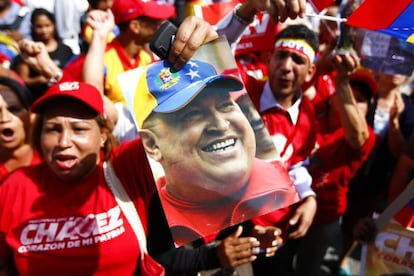Chávez makes sudden return to Caracas but future remains uncertain
Venezuelans yet to see leader after he was whisked off to a military hospital

The walls of the Carlos Arvelo Military Hospital in Caracas guard the biggest health secret in the Caribbean: the true nature of President Hugo Chávez's illness.
The 58-year-old Chávez, who made an unannounced pre-dawn return to Venezuela on Monday following a two-month stay in Cuba, where he was recovering from cancer surgery, has not been seen in public. Except for a few posts that appeared on his Twitter account saying that he was determined to fight for his health, Venezuelans have not publicly seen or heard from their leftist president since he left for Havana on December 11.
Chávez's arrival took not only his supporters by surprise but also the opposition. His plane landed at 2.30am at the Simón Bolívar International Airport in Maiquetía. Unlike previous return journeys from Cuba - a country he has been visiting since June 2011, when he had his first cancer operation - there were no photographers or supporters to greet him this time around.
The government, headed by Vice President Nicolás Maduro, has been very secretive about his condition; pro-Chávez state governors, National Assembly President Diosdado Cabello and a few of the region's leaders, such as Bolivian President Evo Morales, who traveled to Caracas on Tuesday to visit the president, know the true nature of Chávez's condition.
Independent sources said that the president arrived "heavily sedated" on a private plane
According to a nurse, Dubraska Mora, who was interviewed on the state-run Venezolana de Televisión, Chávez walked into the military hospital without help and showed no signs of having undergone an "invasive procedure."
Independent sources, such as journalist Nelson Bocaranda, who has been accurately reporting on Chávez's health, said that the president arrived "heavily sedated" on a private plane and was taken by ambulance to a medical facility at the armed forces headquarters in Fort Tiuna in Caracas, and not the Carlos Arvelo Hospital.
Government officials have acknowledged that Chávez has trouble speaking because of a surgical incision in his windpipe to help him breathe.
Hundreds of his supporters welcomed the news of his return and have held daily prayer vigils at public squares across the country and outside the Carlos Arvelo Hospital, where the government set aside space for them. Inside, police are guarding the ninth floor of the hospital, which, according to local media reports, is restricted to family members and top government officials.
Meanwhile, the opposition United Democratic (MUD) coalition has demanded that the government announce whether Chávez will be able to see out his 2013-2019 mandate. He was re-elected to a fourth term last October but has not yet been sworn in. The Venezuelan Supreme Court clarified on Monday that the delay can run until six months from his official swearing-in date on January 10.
At the US State Department, a spokeswoman said that it was "a matter for Venezuelans to decide how the transition is going to take place."
"Should President Chávez become permanently unavailable to serve, our understanding is that the Venezuelan Constitution requires that there be an election to seek a new president. And at that point, we would hope that that election would be free, fair and balanced, with open access to the media, etc.," said spokeswoman Victoria Nuland.
Tu suscripción se está usando en otro dispositivo
¿Quieres añadir otro usuario a tu suscripción?
Si continúas leyendo en este dispositivo, no se podrá leer en el otro.
FlechaTu suscripción se está usando en otro dispositivo y solo puedes acceder a EL PAÍS desde un dispositivo a la vez.
Si quieres compartir tu cuenta, cambia tu suscripción a la modalidad Premium, así podrás añadir otro usuario. Cada uno accederá con su propia cuenta de email, lo que os permitirá personalizar vuestra experiencia en EL PAÍS.
¿Tienes una suscripción de empresa? Accede aquí para contratar más cuentas.
En el caso de no saber quién está usando tu cuenta, te recomendamos cambiar tu contraseña aquí.
Si decides continuar compartiendo tu cuenta, este mensaje se mostrará en tu dispositivo y en el de la otra persona que está usando tu cuenta de forma indefinida, afectando a tu experiencia de lectura. Puedes consultar aquí los términos y condiciones de la suscripción digital.








































